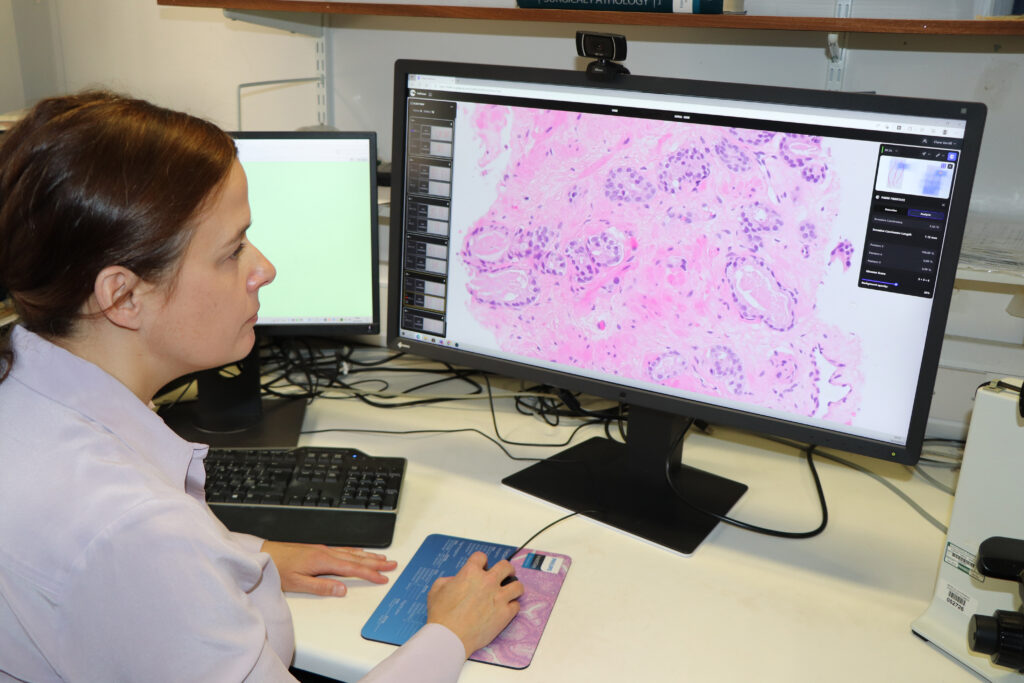New artificial intelligence software that can help to spot prostate cancer is being trialled by researchers at Oxford University Hospitals (OUH) NHS Foundation Trust

Researchers and clinicians in Oxford have begun an evaluation of artificial intelligence (AI) software that could help pathologists diagnose prostate cancer.
Testing of the technology in a clinical setting, which is under way at Oxford University Hospitals (OUH) NHS Foundation Trust, is a key milestone in the University of Oxford-led ARTICULATE PRO study.
This two-year project, funded by an AI in Health and Care Award from the NHS AI Lab in partnership with the Accelerated Access Collaborative, aims to investigate the deployment of AI in the prostate cancer pathway by using Paige Prostate, computer-assisted diagnostic system that aims to help pathologists detect, grade and measure tumours in prostate biopsies, or tissue samples.
OUH pathologists are using the AI applications to help read prostate biopsy slides as part of their routine work. The technology should flag suspicious areas to pathologists immediately by identifying the hallmarks of malignant cells captured by previous training in large datasets of biopsies. It also assesses the amount of tumour present and how aggressive it appears.
The project is led by OUH Cellular Pathology Consultant and Nuffield Department of Surgical Sciences Associate Professor Clare Verrill, an expert urological histopathologist. She leads a multi-disciplinary team of clinical and non-clinical colleagues, including three patient representatives.
Professor Verrill is a key researcher in the NIHR Oxford Biomedical Research Centre’s Surgical Innovation, Technology and Evaluation Theme, which is looking to combine Oxford’s expertise in digital pathology with big data analysis to enhance surgical decision-making.
She said: “One of our key aims in the health service is to diagnose cancers accurately and at an earlier stage so that treatment can be delivered more quickly and, ultimately, outcomes for patients improve. If we can harness this diagnostic technology to achieve this, it will be great news for patients.
“That’s why this evaluation – one of the first of its kind – is an important step. We will be looking not only at how well this software performs in a busy clinical setting and whether diagnostic accuracy and efficiency improves, but also assessing the experience of clinicians and patients, and looking at the impact on workflow.”
She added: “In 2020, OUH’s histopathology laboratory was one of the first in the UK to achieve the milestone of scanning 100 percent of its surgical histology workload. Our digital pathology experience makes us an ideal setting to test AI technologies such as Paige Prostate Suite in a real-world clinical setting.”
Some 46,000 new prostate cancer cases are reported in the UK each year, which represents a 12 percent increase in the past 10 years.
The ARTICULATE PRO team have previously published a survey of Prostate Cancer UK supporters on the use of digital pathology and AI technologies in diagnostic practice
Two other NHS trusts – University Hospital Coventry and Warwickshire and North Bristol NHS Trust – will also assess the Paige Prostate Suite software.
Margaret Horton, Vice President of Clinical Partnerships and Evidence Generation at Paige, said: “With patients in focus as the beneficiaries of Paige’s prostate AI in routine use, we look forward to completing our health economics study assessing the impacts of using AI in routine service.
“We are excited to be evaluating the potential health economic benefits of deploying the Paige Prostate Suite in a large and diverse real-world clinical setting together with our advisors and partners at the York Health Economic Consortium.”